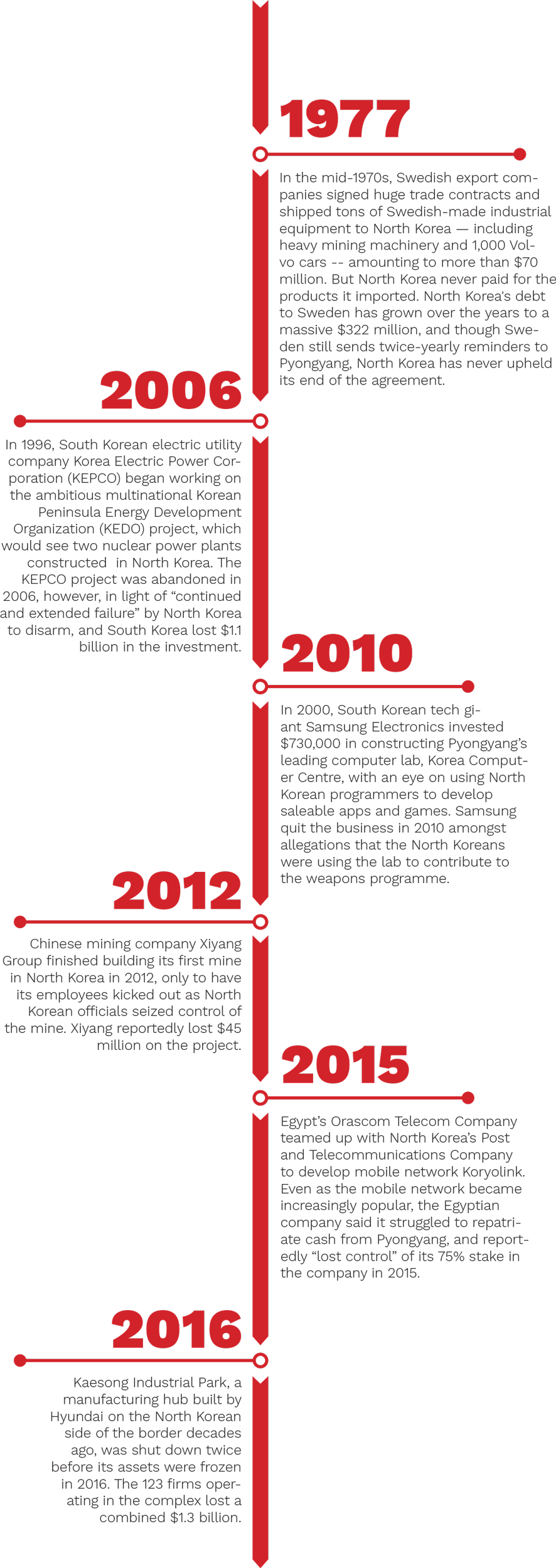In the shade of a small stuccoed hut, a lone Cambodian guard slouched in his seat, picking at his teeth. When asked how to enter the building behind him, he seemed puzzled.
“This is Korea embassy,” he said, shaking his head. “This is North Korea.”
But the guard soon shrugged and pointed out an old and finger-worn doorbell to the right of the compound gate, before slumping back into his chair.
The North Korean embassy sits near one of the busiest intersections in the Cambodian capital Phnom Penh. A tall fence surrounds the compound, the beige front gate topped with decorative gold-tipped spikes. Above and beyond the fence, a North Korean flag flaps in the wind, as it has done since 1991.
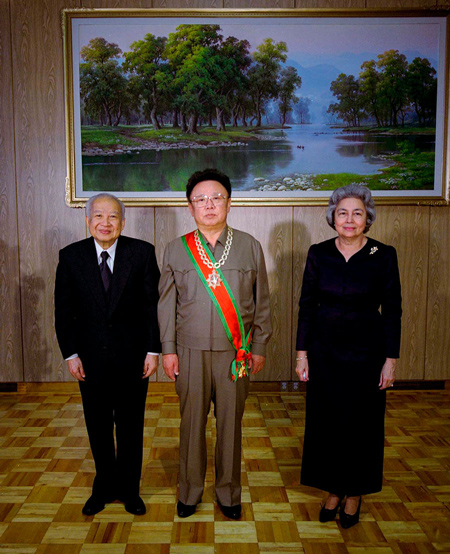
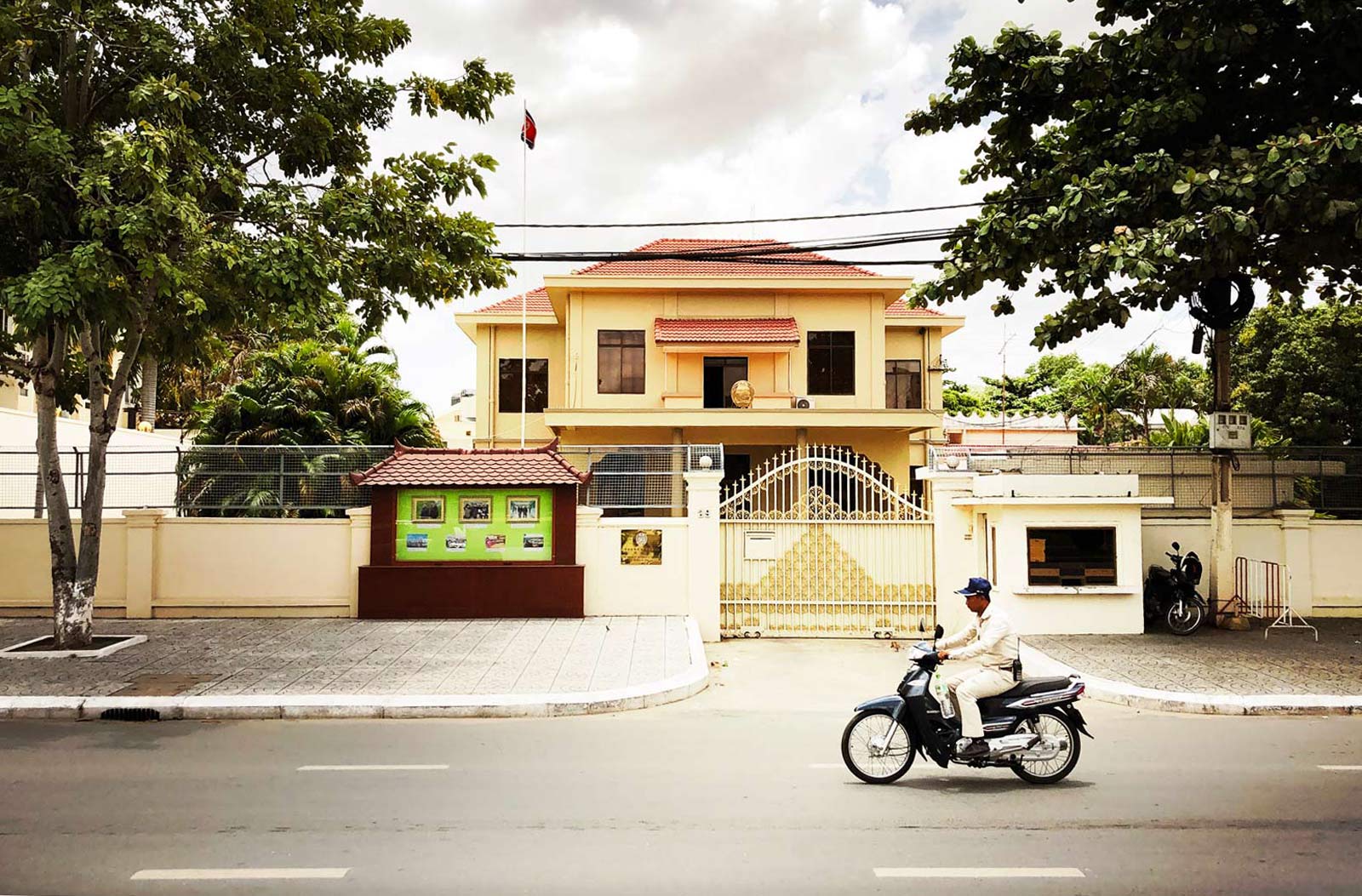
Only after seven long and drawn-out rings of the bell did the automatic gate begin to slide open. Several yards inside, a North Korean man walked quickly up the driveway, gesturing the visitor into the compound, a warm smile playing on his face.
The cordial demeanour was down, however, to mistaken identity. Inspecting the visitor’s press pass, the official’s face twisted into annoyance and distaste as he refused to answer questions about North Korea’s economic ties to Southeast Asia.
“No no no, I am very busy,” he said. “I am very busy, I do not answer questions now. Later, later.”
He brusquely ushered his guest out the front gate and off North Korean soil. Refusing to give a time when he would respond to questions, he let his promise of “later” hang stale in the air as the gate slid shut.
A land of opportunity
According to an agreement with Cambodia’s late king, Norodom Sihanouk, North Korea should have abandoned the embassy compound nearly a decade ago. The 20-year rent-free lease expired in 2011 and the site – where Sihanouk was born – was to be converted into a museum.
But the North Koreans look unlikely to pack up anytime soon. The embassy is but one of many signs of the country’s influence in Cambodia and across Southeast Asia – a sway that is holding steady despite Pyongyang incurring sanctions over missile tests.
All but two ASEAN member-states host North Korean embassies, while all ten have embassies to North Korea – five of which are located in the controversial country.
Pyongyang’s ever-increasing stockpile of nuclear weapons has prompted the US, UN and EU to pass increasingly stringent sanctions on economic dealings – measures, however, that many countries have proven unwilling to adhere to.
“Boy, look at that view. Wouldn’t that make a great condo?”
US President Donald Trump, eulogising North Korean beaches
While North Korea has warranted on-off global media attention over recent decades, the last four years have seen the so-called hermit state seemingly trying to hog the limelight.
US President Donald Trump made history on June 30 when he met North Korean leader Kim Jong Un at the demilitarised zone straddling the border between North and South Korea, ceremonially stepping over the ankle-high concrete boundary to become the first US president to enter North Korea while in office.
“I outlined the incredible prosperity that awaits North Korea when this whole thing gets settled,” Trump said after the meeting.
The president envisages glittering economic prospects for North Korea; and, as a true businessman, commented admiringly on what he sees as the country’s real estate potential. After his first meeting with Kim in Singapore in 2018, Trump said: “They have great beaches. You see that whenever they’re exploding their cannons into the ocean. I said, ‘Boy, look at that view. Wouldn’t that make a great condo?’”
Eccentric Singapore-based millionaire and American businessman Jim Rogers shares Trump’s optimism about North Korea’s economic potential. Quickly responding to an interview request, Rogers was just as quick to defend his left field take that North Korea has become a prime business destination.
The Vietnamese should be heading there soon, and everyone in Southeast Asia should get on the next flight. They simply don’t have any competition right now”
Jim Rogers, Singapore-based investor
Rogers denied rumours that he was lining up a trip to North Korea – a potential violation of US law – but nonetheless urged all businesses, including Southeast Asian companies, to put visiting Pyongyang on their to-do lists.
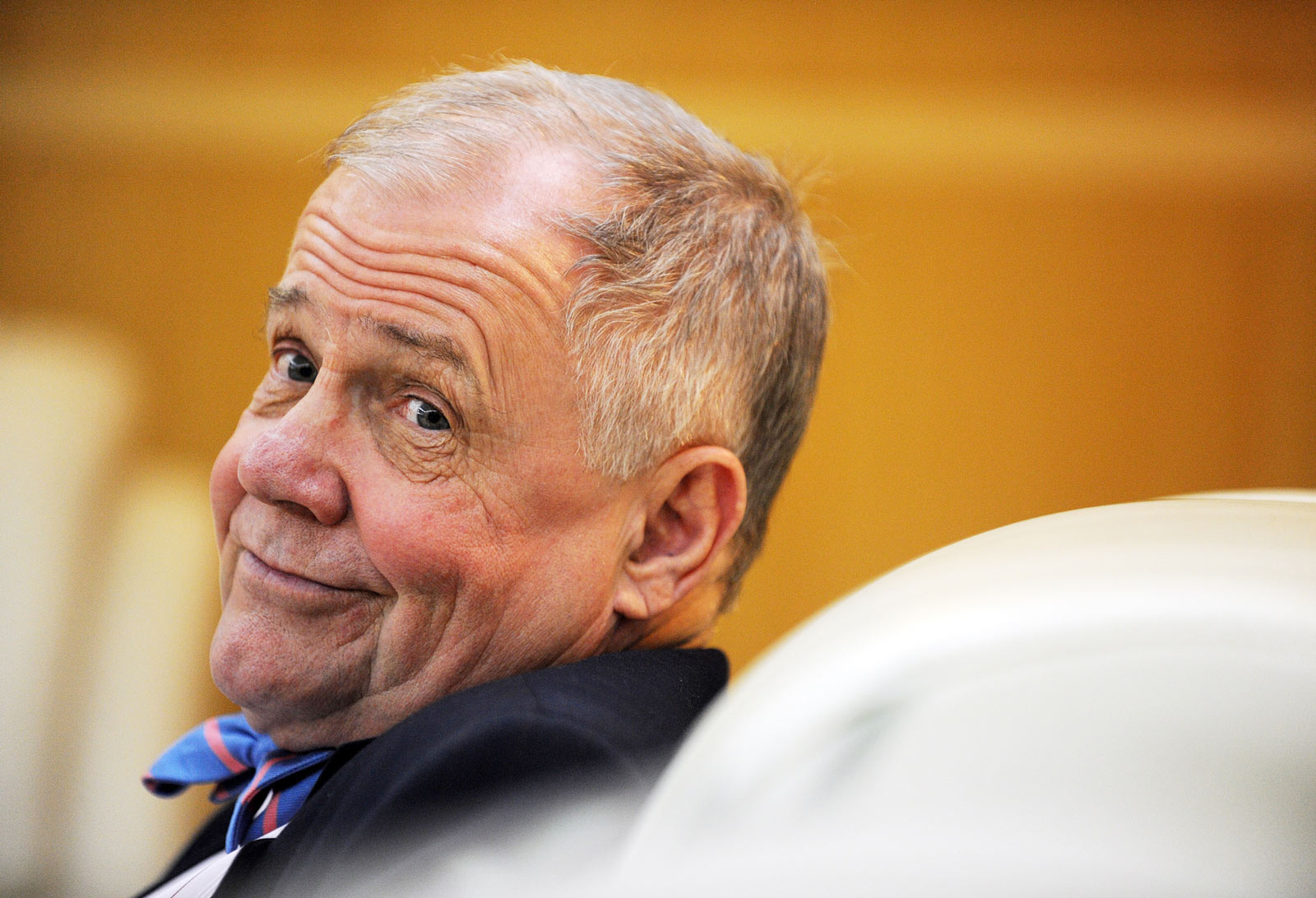
With a thick southern American accent to match his Dixieland bow tie and suspenders getup, Rogers claimed that there are no limits to what an investor can do in North Korea: “Sell everything!” he implored. “You know how to make soap? Then go [to North Korea and] make soap. There are shortages of everything in North Korea.”
“If I told you there was a country where you don’t have to compete with the Americans, the Japanese or the South Koreans, you’d say ‘Let me go! I want to be there as soon as I can!’” he suggested. “And at the moment, that is the situation… The Vietnamese should be heading there soon, and everyone in Southeast Asia should get on the next flight. They simply don’t have any competition right now.”
But once borders open and foreign companies pour in, Southeast Asian businesses will lose their chance to make a mark, Rogers believes.
“Once you have to compete with Japan, US and South Korea, it will be a different ballgame,” Rogers said.
Though conceding that some ASEAN member states – Laos and Myanmar among them – may not be home to the business landscape necessary to foster international investment, Rogers urged others from the region to make a move for Pyongyang.
“All of those Southeast Asian companies… should be there now.”
The economic ties that bind
Southeast Asia does not, as Rogers would have many believe, have the all-clear to make business deals in North Korea. ASEAN member-states are members of the World Trade Organization and the UN – both of which mean adhering to sanctions against North Korea, making economic relations with Pyongyang a tricky gamble that could see Western support stripped from violating countries.
A dice roll, yes – but one that many companies have not shied away from. According to a recent UN investigation, there is significant under-the-table business taking place between North Korea and Southeast Asia.
North Korean ships have been spotted at Vietnamese and Indonesian ports unloading banned cargo. Multiple North Korean ships appear to still be using the Cambodian flag of convenience, notwithstanding Cambodia’s official disapproval of the practice. And though it was among the first to comply with Washington’s sanctions, Thailand – which promised to sever all investment in Pyongyang by the first quarter of 2018 – has continued to import and export thousands of dollars’ worth of iron and steel, textiles, electrical equipment and transportation vehicles to and from North Korea.
Singapore, along with the Philippines, has gone above and beyond in implementing sanctions, banning all trade with Pyongyang. Regardless, numerous Singapore-based companies, including Chinpo Shipping Company, luxury goods company T Specialist and partner firm OCN, and drinks company Pokka have been accused of – or admitted to – illegally shipping goods to North Korea through China. Singapore’s Ministry of Foreign Affairs refused to comment on the ongoing investigations.
Shawn Ho, an associate research fellow at the S. Rajaratnam School of International Studies, part of Singapore’s Nanyang Technological University, told Kyodo News that some Southeast Asian investors were casting an eye towards North Korea – though he stressed that ongoing sanctions made any new business dealings unlikely.
“ASEAN member states believe it is important to remain neutral in their respective foreign policies,” Ho said. “[And] some businesspeople from various ASEAN member states are interested to explore business opportunities in [North Korea].”
This opportunism was evident during the North Korea-US summit in Vietnam in February, when a handful of prominent local companies courted North Korean delegates with tours and demonstrations. Leading conglomerate Vingroup took the Koreans on a tour of its factories and high-tech farms, state-owned telecommunications company Viettel showed delegates its mobile operations and telecommunications equipment, while An Phat Bioplastics introduced a delegation to biodegradable bags and had them plant trees on company grounds.
As expected, the companies told news outlets that interest in North Korea is on hold until sanctions are lifted and commercial relationships can be above-board.
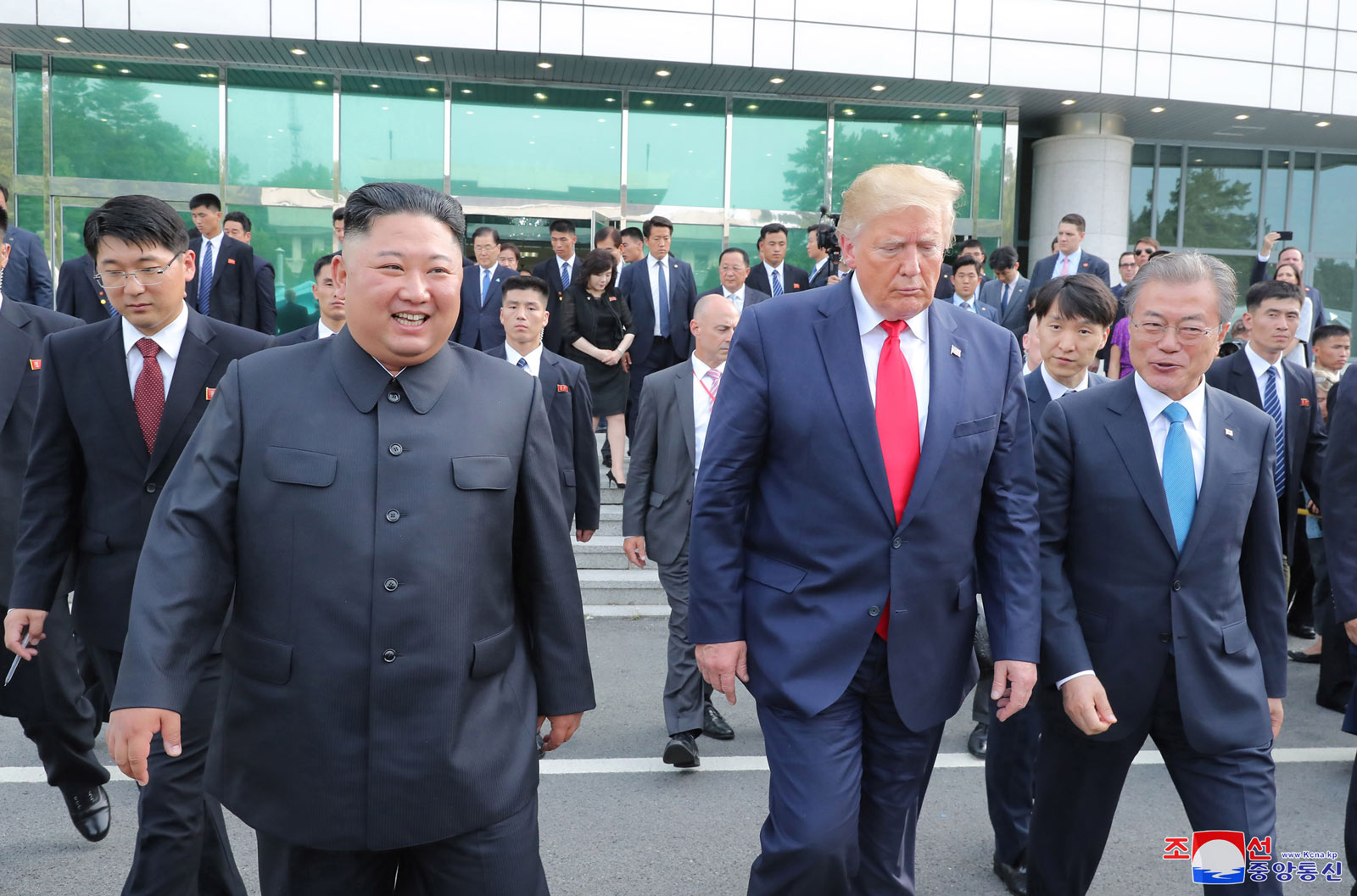
High risk, minimal reward
Regardless of the numerous violations, sanctions against North Korea appear to be working. Pyongyang isn’t especially willing to share its economic status, and experts agree that whatever statistics the country shares have likely been manipulated and are unverifiable. But the regime, which held its annual budget meeting in April, has admitted that the country’s economy is struggling. According to government reports, the growth rate for 2018 – given as 4.6% – was the lowest since 2006.
“Even if sanctions were completely removed and North Korea began to open up its economy, trade between ASEAN and North Korea would still essentially be a rounding error compared to ASEAN’s trade with South Korea or the US”
Daniel Wertz, The National Committee on North Korea
North Korea’s slowdown may be even worse than the Kim regime admits. According to a South Korean central bank’s annual report published in July, North Korea’s gross domestic product shrank by 4.1%, the worst in over two decades, with its trade allegedly falling considerably as well.
So yes, there is room for growth – but it is questionable whether there is enough scope for growth for North Korea to be a viable commercial partner for Southeast Asia. Individual companies may be able to get in on the ground floor and, despite the lack of transparency and sketchy rule of law, manage to make money in North Korea. But no country in the region is likely to benefit greatly from economic ties to Pyongyang, for the foreseeable future at least.
According to Daniel Wertz, programme manager at The National Committee on North Korea, a non governmental organisation based in the US, North Korea’s economy is too small to matter. Though Pyongyang has proven adept at circumventing sanctions in the region, this is likely due to a lack of technical capacity or political will to end all economic relationships than it is a concerted state-level effort to make money.
“Even if sanctions were completely removed and North Korea began to open up its economy, trade between ASEAN and North Korea would still essentially be a rounding error compared to ASEAN trade with South Korea or the US,” Wertz wrote in an email. “Economic interests in North Korea aren’t really an important driver in ASEAN countries’ policies.”
“Companies that do business with North Korea are (like any business) ultimately in it for the money,” Wertz continued. “Inevitably, some less scrupulous businesses will see the promise of outsized profits as worth the risk of getting punished for violating sanctions.”
Kim Heir Rouge
Asked whether Southeast Asia might benefit from an ongoing economic relationship with North Korea, especially after the borders open and trade has a chance to flourish, Cambodian-American political scientist Ear Sophal was adamant that the region would be unimpressed by the returns.
“I don’t think North Korea is a viable market… Their people are starving and in concentration camps,” Sophal said, adding that North Korea’s economic presence in Cambodia – his birth country – is likely more beneficial to Pyongyang than it is to Phnom Penh.
“Are they going to buy Cambodian-made garments? Cambodia rice? Maybe… but they are not a market-based economy. What foreign exchange do they have?”
Despite sanctions, several North Korean businesses – including the Angkor Panorama Museum and several restaurants, part of a chain called Pyongyang – operate in Cambodia.
Sophal believes his homeland is funding North Korea’s “dictatorial” regime without promise of returns. Likening Pyongyang’s leadership to the genocidal leaders of Cambodia’s Khmer Rouge, he added that Cambodia – perhaps more so than other Southeast Asian countries – has a moral duty to curb economic ties to North Korea.
“If [Khmer Rouge leader] Pol Pot were still in control of Cambodia and had businesses in other countries to generate income using essentially slave labour, I would not support them,” Sophal said. “I think North Korea is today’s Democratic Kampuchea.”
A previous version of this article mistakenly implied that RSIS associate research fellow Shawn Ho had spoken of ASEAN-based companies maintaining business dealings with North Korea in defiance of ongoing sanctions. The piece has been updated to reflect his views.

